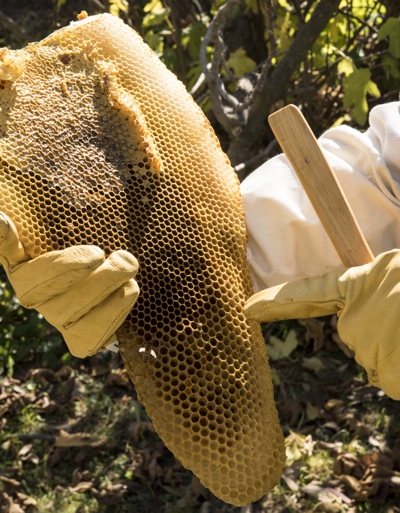Frequently asked questions
Swarm relocation
What should I do when I find a swarm?
Please keep your distance and give us a call. In most instances, a swarm of honey bees is happy to ignore you as long as you respect them.
Does it cost anything to have a swarm removed / relocated?
As responsible beekeepers, we see it as our duty to provide this community service at no cost to the property owner.
What happens to a swarm once it has been collected?
After collection, we quarantine the bees at an isolated site to confirm they aren't carrying any unwanted pests or diseases eg. foul brood, chalk brood, small hive beetle. After passing quarantine, they are moved out of their temporary accommodation into more permanent lodgings and form part of our free range apiary. It's long been our practice to name rescued bee swarms after either the street name or property owner they are collected from.
Are you insured?
Yes. All swarm collectors listed on this site must be insured before we accept their listing. This protects you, your property and the reputation of our beekeepers. We strongly suggest that this be your first question to any potential swarm collector. For further peace of mind, our beekeepers also hold current police clearances.
Are you associated with the Beekeepers Association of the ACT?
No. Although several of our beekeepers are active members in the Beekeepers Association of the ACT (BAACT), canberrabees.com has no affiliation with the club and operates completely independently as a loose knit group of like minded beekeepers.
Like the BAACT, we also fully support the Code of Practice for Beekeeping in Residential Areas of the ACT and the registration of bee hives in the ACT.
Do you remove swarms from wall / roof cavities?
Established hives in permenant structures require specialist equipment for removal. Attempts to remove these swarms without the correct equipment is likely to cause damage. We are happy to provide advice on the best way forward if we aren't able to rescue the bee swarm from its location.
Will you pick up my old bee hive if I am no longer able to care for it?
Yes. However, due to the prevalence of honey bee diseases in unmaintained hives, we will conduct a full hive inspection to ensure they are free from pests and diseases before removing the hive from your property.
Can I re-home the swarm that has been collected?
Yes. After collection and quarantine of the swarm we can arrange to deliver the rescued bees back to you in a brand new Langstroth hive. For more information, please mention your interest to our beekeepers when they arrive to collect the swarm.
Beekeeping courses
How regularly are your beekeeping courses held?
During peak season, courses are held monthly. Please check back to the site regularly for course details, or alternatively sign up to be notified by email when new course times are made available.
How long do your beekeeping courses run for?
Our beekeeping courses are run over 3 consecutive Saturdays and/or Sundays. Each day (session) is conducted over a four hour period with regular breaks. We find that this is the perfect length of time for participants to absorb new information and apply the practical (hands on) elements of what is covered.
What can I expect to be covered in your beekeeping course?
Everything you need to confidently establish your own backyard beehive, or aternatively decide that keeping 60,000 stinging insects may not be for you (yet). If interested, please contact us for our beekeeping course outline with a detailed breakdown.
What types of hives are covered in your beekeeping course?
Whilst we cover multiple hive styles (including Warre, Kenyan Top Bar, Langstroth and Flow Hive), all course practical elements are conducted using Langstroth hives and Flow Hive / Langstroth honey supers including a variety of different depths (ideal, WSP and full depth).
What is the background of your beekeeping course presenters?
Raised on royal jelly from infancy with the waggle dance as their first language, our presenters (certified bee whisperers) have more experience than you can poke a hive tool at. Luckily for participants, they are more than willing to share their knowledge and experiences to ensure a smooth transition from a 'keeper of bees' to a beekeeper.
What do I need to bring to your beekeeping course?
Ideally you will bring long pants, closed in shoes, and sun protection. We will supply all smokers, hive tools, bee suits, gloves, bee hives and bees. We also supply morning tea, lunch and tea and coffee facilities throughout the course.
I have a Flow hive / Flow frames, will I still find this beekeeping course useful?
Absolutely yes. We've had a number of course participants new to beekeeping who chose a Flow hive as their introduction to beekeeping. As the Flow hive layout is based on the Langstroth design, all aspects of hive management covered in our beekeeping course remain highly relevant to Flow hive owners. Practical advice and demonstrations using our own Flow hive are included in the course to ensure your bees have a positive and productive outcome with your own Flow hive.
Can you supply bees for me to establish my own hive?
Absolutely! Not only can we provide nucleus hives, participants on the course are eligible for a 10% discount off the standard price of a nucleus hive if purchased at the same time as the beekeeping course booking.
